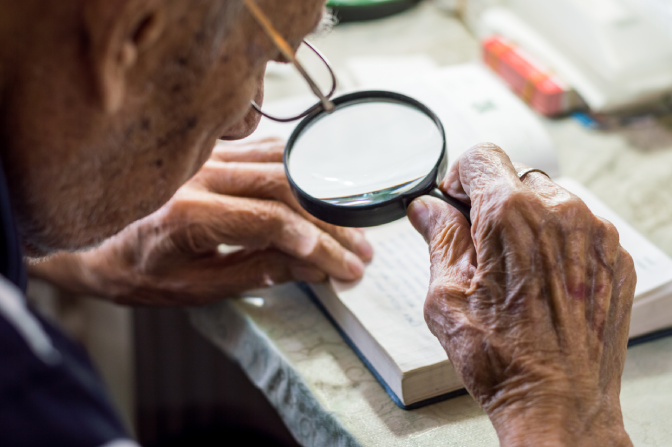50% OFF a Complete Pair of Glasses
*Restrictions apply. Click here for details.
North Carolina Low Vision
Find the Care You Need for Low Vision at eyecarecenter

If you are experiencing blurry vision and are not able to see well enough to do everyday activities such as reading and driving, you may be suffering from low vision. Low vision is most often a symptom of a condition, not a condition on its own. It is common in individuals suffering from vision problems like age-related macular degeneration, cataracts, diabetic retinopathy, or glaucoma.
Even if you are suffering from changes in your vision, it's not too late to get an eye exam from our team of North Carolina low vision specialists and begin your road to recovery.
See an eyecarecenter Low Vision Specialist in North Carolina

If you are experiencing blurry vision and not able to see well enough to do everyday activities such as reading and driving, you may be suffering from low vision. Low vision is most often a symptom of a condition, not a condition on its own. It is common in individuals suffering from vision problems like age related macular degeneration, cataracts, diabetic retinopathy, or glaucoma.
Even if you are suffering from changes in your vision, it's never too late to get an eye exam at your nearest eyecarecenter!
Types of Low Vision
There are a few different variations of low vision and each one can create unique challenges and vision loss.
Central vision loss - a blind spot in the center of the visual field
Peripheral vision loss - loss of side vision in either one or both eyes or lose of top and bottom vision in one or both eyes
Night blindness - the inability to see in poorly lit areas such as outside at night or in movie theaters
Blurry - objects near and far are out of focus
Hazy vision - the field of vision appears to be covered in a film or haze
What Is Low Vision?
Total blindness is when an individual has no light perception whereas someone dealing with low vision still has light perception. Individuals with low vision can have visual fields that include blind spots, poor night vision, and blurry sight. It is important to note that two individuals with low vision may experience different symptoms and varying degrees of the same symptom. Low vision is unable to be corrected with glasses or contact lenses or surgery. Low vision is diagnosed in individuals with a visual acuity worse than 20/70 and sight that can not be corrected with eyeglasses or contact lenses. Low vision can be caused by a number of different conditions that are both genetic or environmental:
Macular degeneration
Diabetes/Diabetic retinopathy
Glaucoma
Cataracts
Retinitis pigmentosa
Inherited diseases
Eye injury
How is Low Vision Diagnosed?
Low vision is defined as having less than 20/70 eyesight, therefore a standard dilated eye exam can diagnose the condition. This exam is painless and your eye care provider will ask you to read letters while they conduct a visual evaluation. They may also check your peripheral vision during the exam. Your doctor may also dilate your eyes to check for eye diseases and conditions that cause low vision. If you are older than 60, or African American and over 40, or have a family history of glaucoma you should get a low vision exam every one to two years.
Visit Our North Carolina Low Vision Specialists at eyecarecenter

Worried you may have low vision or an underlying vision condition? Call or click to schedule an eye exam at one of our North Carolina office locations!
Frequently Asked Questions About Low Vision
It is possible to have low vision and be legally blind. To be considered legally blind your vision is 20/200 or below out of your better eye or, your field of vision is less than 20 degrees. This means that if an object is 200 feet away, you would have to be 20 feet from it to see it clearly. Those diagnosed with low vision have a visual acuity equal to or above 20/70 vision.
Because of the two eye condition’s different diagnostic criteria, most individuals with low vision are not considered legally blind. It is possible for legal blindness can occur if the symptom is not addressed making it very important to schedule an eye exam when you start to notice changes in your vision.
At eyecarecenter our goal is to provide each patient with their best possible vision.
eyecarecenter has many offices with low vision doctors conveniently located across the state of North Carolina, including an office near you. Be sure to schedule an eye exam with the closest low vision doctor here or by calling (844) 393-2428.
There are a wide variety of eye conditions that can cause low vision. The most common being:
Macular degeneration - a disorder that affects the retina
Diabetes - can cause daily vision changes including diabetic retinopathy
Glaucoma - will cause damage to the optic nerve
Cataracts - caused by long-term exposure to UV radiation or an injury
Retinitis pigmentosa - an inherited disease that will eventually destroy night vision
Injuries - stroke, brain damage, eye trauma, or head trauma
